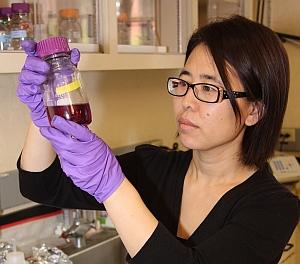Ecological engineers at Oregon State University in Corvallis developed techniques that advance the use of wastewater from cities or factories to generate electricity. The findings of the team led by Hong Liu (pictured right), professor of biologicial and ecological engineering, appear in the journal Energy and Environmental Science; paid subscription required.
Earlier microbial fuel cells that generate electricity from wastewater either produce only limited amounts of power, or use a process known as anaerobic digestion that produces methane, itself a potential greenhouse gas. The Oregon State method uses bacteria that oxidize the organic matter in the wastewater and, in the process, produce electrons that run from the anode to cathode inside the fuel cell, creating an electrical current. The process can also use organic matter in other agriculture and industrial waste products, such as straw or by products from wine, beer, or dairy product plants.
The Oregon State team refined the microbial fuel cell by finding more effective microbes, reducing the space between the fuel cell’s anode and cathode, and devising new separator materials. The researchers report the fuel cell ran 63 consecutive days, producing more than two kilowatts per cubic meter of liquid reactor volume. This power density exceeds other microbial fuel cells, say the researchers, generating 10 to 50 times the electricity, per volume, than most other microbial fuel cell approaches.
The current activated-sludge methods of wastewater treatment use energy, as much as three percent of the electric power generated in the U.S., according to the Oregon State team. But the researchers believe this new process could turn around the economics of wastewater treatment. “If this technology works on a commercial scale the way we believe it will,” says Hong Liu, “the treatment of wastewater could be a huge energy producer, not a huge energy cost.”
Hong Liu and colleagues now seek to take the technology from the lab to a pilot study, and are looking for funders for the project. A good candidate, she says, would be a food processing plant, that produces a steady supply of certain types of wastewater in a contained system that would provide significant amounts of electricity.
Once advances in the technology reduce high initial costs, researchers say capital construction costs of the technology should be comparable to the activated sludge systems used today. Factoring in potential sales of electric power back to the utility, overall net costs of the process would be reduced even further.
Read more:
- Report: Investment Increasing In Water Technologies
- Algae Protein Electrodes Boost Photosynthesis Process
- Microbes Found to Clean Nuclear Waste, Generate Electricity
- Microbes Reduced Adverse Impact of BP, Exxon Valdez Spills
- Process Turns Algae into Renewable Fuel, Cleans Wastewater
* * *


 RSS - Posts
RSS - Posts
You must be logged in to post a comment.